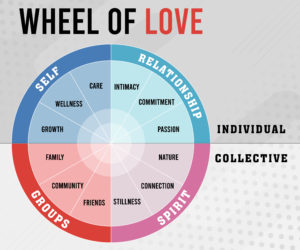In the singer Amanda Palmer’s TED talk on The Art of Asking, she talks about working as a living statue and handing out flowers to passersby. She shares how impactful it was to share silent eye contact with a stranger. With her eyes she would try to say, “I see you,” and their eyes would often reply, “Thank you. No one ever sees me.”
This is the description of a powerful moment that two people can share: the very real seeing and understanding of the other. That understanding, that seeing and that knowing, is the root of love. It is a magnificent thing to both have and receive. If we are to truly expand and deepen our love, we must fully understand that it means to know and understand a person.
Love is Understanding
Love is a lot of things. It is an emotion, an intention, a path, and a verb. But more importantly, love is a deep understanding of someone and their world. True love involves opening to, recognizing, and seeing who somebody truly is.
This is why some of the most powerful questions we can ask our intimate partners are the most open-ended ones. If you say something like, “Honey, do you like living in this part of town?”, that only gives your partner the opportunity to say yes or no and maybe give some clarifying information.
A better question would be, “Honey, what do you think about our house?” or “Honey, what have you been struggling with lately?”. These questions will help you form what the relationship researcher John Gottman calls a “Love Map” of our partner: a deep knowledge of their internal world.
If you still want deeper intimacy with your partner, you have to go deeper by taking your understanding further. You have to remove all distractions that prevent you from truly paying attention to this person and welcoming in all aspects of their being. Then, you have to take their hand, sit down, look deeply into their eyes and ask, “How can I love you better? How can I best love you right now in this moment? What are you needing?”.
You might think that you love someone, but if you do, you have to truly ask yourself, do you understand them? Do you know them? Do you know their dreams, fears, insecurities? Have you asked them what they regret, what they want, and what they need?
As the great mystic Hafiz put it, these questions happen all the time in heaven, and maybe one day they will happen on Earth. The Vietnamese monk Thich Nhat Hahn put it this way,
We must look deeply in order to see and understand the needs, aspirations and suffering of the person we love. This is the ground of real love. You cannot resist loving another person when you really understand him or her.
We have to know that love is knowing, because our love most often breaks down when we haven’t taken the time to truly love and understand someone.
When We Fail to See Another Human Being
In 1994, the terrible and gruesome Rwandan Genocide occurred, where an estimated 800,000 people from the Tutsi minority were massacred by the majority Hutu population in just over just 100 days.
If you are wondering how such an extreme event could happen so quickly, it would help to know that one common technique to get one group of human beings to kill another group of human beings is simply to dehumanize the latter. It is easy to kill someone if you do not feel they are a someone at all; if you deny them having their own valid reality, thoughts, emotions, and experiences.
In the case of the Tutsis in Rwanda, they were labelled as inyenzi, meaning cockroaches, and politicians called for their “extermination.” During the Holocaust, the Nazis referred to Jews as rats: dangerous, disease-carrying rats. In the history of the United States, Native Americans were considered “savages,” and African American slaves as more akin to monkeys.
Today, we still see all kinds of dehumanization today being used to justify terrible treatment of segments of people, with labels like terrorist, illegal, and criminal being used to justify a denial of basic human rights. Dehumanizing a group of people with pejorative labels is one way to manipulate our mind’s own in-group bias for political gain.
The way out of dehumanization is of course, humanization, and the way towards humanization is empathy and understanding. It is the path of love, of truly paying attention to someone, listening to their story and fully trying to understand their perspective.
Truly Knowing Someone
Hence the inscription on a podium at one Rwandan genocide memorial written by one of its survivors: “If you really knew me, and you really knew yourself, you would not have killed me.”
If you look at most problems with the human condition, you might notice that they are the result of not a lack of love, but limited of love. We love our country but go to war because we have yet to know and understand the people in the other country. If we actually took the time to listen to the stories of the people we are at war against; if we truly paid attention to them, we would, of course, not go to war at all.
In fact, if we truly knew anybody, we would not have any hatred for them at all because we would see and understand where they are coming from. We would know their stories of struggle, pain and heartbreak, which would open up our heart to compassion for this person.
It works both ways, too. If we love someone, we seek to understand them. If we truly understand them, we love them. This is why the 36 Questions That Lead to Love are so effective at getting two random strangers to fall in love with each other. By putting two people alone with each other in a room, free of distractions, and giving them open ended questions like, “What does friendship mean to you?” and “What roles do love and affection play in your life?”, they will naturally start to care for each other.
You probably know the saying “Be kind, for everyone you meet is fighting a hard battle.” That phrase works both ways too. Once you learn about the battles a person is fighting, you will be more kind to them. Once you understand someone, you love them.
What Does Life mean to You?
Asking deep questions and listening intently to people’s answers came up for me personally after teaching a day-long philosophy workshop. I began by explaining that philosophy seeks to answer fundamental questions of the human condition like, “Why are we here?” and “What does it mean to be a good person?”
I had participants pair up and ask each other more questions like, “What do you think happens after we die?” and “Have you ever had an experience in your life that you could not explain?”
When I met with the group again the next day, one of the participants said that she went home and asked her husband the same questions they asked in class, and she was surprised at how much she didn’t know about her own husband’s internal world.
This experience is quite common. If you are in partnership, ask yourself, do you know what your partner thinks happens when they die? Do you know what their dreams and aspirations are? Do you know if they think they are a human being on a spiritual path or a spiritual being on a human path?
We often don’t know, not because we don’t ask questions, but we don’t ask the right questions of each other. We ask our partners about the weather and work and what kind of new furniture we want to buy, but we don’t ask them about how their heart feels and what their dreams are. If we want to love someone, we have to begin to understand and see their internal world, and in doing so, we love them more.
That is truly what love is all about. It is looking deep within and saying, “I see you,” and hearing that oh so sweet reply, “Thank you. No one ever sees me.”









